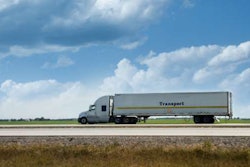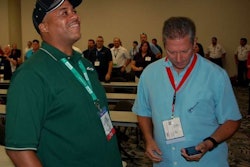I meet Donald Norton at the Boyd Brothers Transportation terminal in Birmingham, Alabama. He’s on his way to Knoxville with a load of lumber, and I’m hitching a ride with him to Chattanooga. After more than a decade in trucking and over a million safe miles with Boyd Brothers, Norton has plenty of things to say about the industry, and the experience to back it up.
“This time of day is always fun trying to get out of Birmingham,” Norton says, jokingly, as we pull out of the terminal and approach rush hour traffic.
Within minutes of merging on to the congested interstate, Donald starts pointing out why four-wheelers are his biggest safety concern on the road, and why most others share his view.
“We’ve got an exit ramp coming up,” says Norton. “You will have a car over in the left lane that’s going to get off up there, and instead of falling back and going to the right behind you, they’re going to run up and cut straight across you.”
From the shotgun position of Donald’s cab, the reason for his frustration becomes clear. What may seem like a safe passing distance to a four-wheeler is actually forcing Norton to quickly apply his brakes in order to avoid a collision. This happens several times in the first half hour of our trip, either from cars cutting across him to exit, or from vehicles merging onto the highway without speeding up.
“It’s not that we feel like we own the road,” Norton explains. “It’s just that we’re pushing 80,000 pounds and we can’t stop or take off as fast as a car.”
As we leave Birmingham and traffic starts to dissolve, our conversation moves to e-logs and other regulatory concerns. Norton has a cautiously optimistic view of trucking’s future. He still uses paper logs, and unless he gets a violation, won’t be outfitted with an electronic log until the mandate takes effect. Norton is hopeful that the mandate will level the playing field by holding every driver to the same rules, and he has no argument against making the change from paper himself. But he’s worried that the mandate, in its current form, may create some unnecessary safety issues.
“What I’ve seen so far is that a lot of drivers that are on the electronic logs are driving recklessly because they’re pushing the clock,” Norton says. “How the old rule worked, if you stopped during the day to take a break and went to the sleeper for two hours, it would extend your day. By putting you on electronic logs they’ve done away with that.”
Throughout his career, Norton has learned to roll with the changes in his industry, but he likes to keep to the status quo when he can. That’s why he’ll keep logging his miles on paper until the January, 2017 deadline comes around. It’s also why he drives a truck with a manual transmission, and has no desire to switch to automatic. It’s what he knows, and it’s what he likes. Out of all the recent industry changes, what worries Norton more than any mandate or regulation are his recent difficulties with parking.
“Parking is getting to where it’s a headache,” Norton says. “A lot of states don’t have the funding and they’re closing rest areas and truck parking areas. With E-logs, it’s really getting to be a problem, because a lot of truck stops are going to reserved parking. It costs you 15 bucks to park!”
Norton’s solution is to plan ahead. He starts his day by calling his customer to see if they have overnight parking available. If they don’t, he looks for a Walmart in the area of his delivery. Since he brings frozen food on the road with him, Norton doesn’t rely on restaurants for his meals and therefore doesn’t rely on truck stop parking. When he does park at a TA or a Petro, he does his best to arrive before 7 p.m., which, according to him, is when most truck stops fill up.
As we cross into north Georgia and begin gaining elevation, Norton reveals that he likes to keep things simple when he’s not driving. When he’s parked at night he watches classic western movies on his TV (John Wayne’s Rio Bravo is his favorite). When I ask what he likes to do when he’s home for the weekend he simply smiles and says, “Nothin!” In actuality, Norton’s weekends are usually filled with chores and socializing with family and friends, but relaxation is always his goal. One weekend ritual he never misses is a breakfast get together at his local McDonald’s known as “The ROMEO Club.” Norton explains that Romeo is an acronym for “Retired Old Men Eating Out.”
“It’s a lot of guys I’ve known for years that go to church with me, and a few drivers are in the group,” says Norton. “We sit around and talk and try to solve world problems on a Saturday morning.”
Of course, since he’s still driving full time, the ROMEO Club’s retirees like to point out that Norton is technically a member in training.
As long as he’s healthy and able, Norton plans on making his living behind the wheel of a truck. Even with it’s daily challenges and headaches, truck driving is a lifestyle he can’t imagine not being a part of.
“You do it for a little while, and you get it in your blood,” Norton says, as we exit for Chattanooga. “I’ve been out here doing it constantly since ’99 and I don’t know if I could go back to a job where I’ve got somebody standing over me all the time. You’ve got so much freedom driving a truck.”
My trip ends in Chattanooga, but Donald pushes north towards Knoxville, where he’ll deliver his load in the morning and then get his next assignment for a new load, a new destination, and new day spent on the road.










